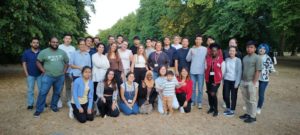We are delighted to announce that our recently retired Associate Editor for Journal of Materials Chemistry A and Materials Advances, Professor Magdalena Titirici, was included in the annual Highly Cited Researcher list recently released by Clarivate!
We interviewed Professor Titirici to take this opportunity to find out more about her recent work and the challenges she faces in her field.
Please could you provide a short summary of your most recent work?
My most recent work has been on two fronts: (1) Raising awareness on the importance of developing more sustainable batteries. I am currently researching Na, K and Al based systems as well as looking to reduce the amount of Li in Li-S batteries; (2) Turning waste (biomass or plastic) with electricity into high value chemicals and fuels.
What is the current biggest challenge you face in your field?
The biggest challenge is the complexity of electrochemical devices with many components and interfaces in between. Most groups are studying one individual component at the time (either the anode, cathode, electrolyte, current collector, etc). This makes progress too slow. We need a holistic system approach, but the complexity of the many interfaces resulting from putting various components together hinders progress. Yet these interfaces are interdependent and should be understood cooperatively. In addition, there is no standardisation on how measurements on electrochemical performance should be done in various fields. Consequently, the data published in the literature are often inaccurate and difficult to reproduce due to the different ways of making, assembling, and measuring various components and devices. I think we need to learn from other fields such as pharma industry, and bring in robots that are able to perform laborious task to do the synthesis, characterisation, and assembly. Such robots should operate hypothesis driven based on the knowledge already developed in the literature by many individual research groups. This new way of working would eliminate errors and help standardisation of electrochemical measurements and data sharing. Human researchers should instead focus on developing tools for the complex data analysis from high throughput experimentation and on understanding the fundamental science for optimisation and new discoveries with the help of computational approaches. Funders, can we please get a robot in each electrochemical laboratory in the world? 😊
What advances in your field are you most excited about?
I am very excited about all the recent developments on Na ion batteries from fundamentals up to higher TRL level at cells and packs. I am equally excited about the boom in research on electrochemical driven processes to make our future chemicals and fuels.
What does it mean to you to be a Highly Cited Researcher?
It is an interesting question. Today, researchers are told that citations, a high h-index and impact factors of journals are not a measure of research quality. I think they need to be used carefully and will depend a lot on the area of research. I work on materials for energy, which is a popular topic these days, so I guess it is easier for me to be highly cited compared to peers working in other areas. Yet, within my research field, I see it as a recognition of all the team efforts from my past and current research group members and collaborators. For me, it is a testimony that best research is done collaboratively working in very diverse teams. It would be nice if Clarivate could come up with a way of awarding teams rather than individuals.
Why is it important and what advice would you give to up-and-coming scientists hoping to increase their visibility?
Be true to yourself, your values, and your beliefs. There are a lot of good and supportive people in academia, and fortunately, this trend is on the rise. Find them, work with them, and build your network of trust, scientific excellence and human kindness. Be supportive of those who need and value your advice, build a diverse scientific community, and the rest will follow naturally. But even more importantly, don’t forget to also have a life outside work.











